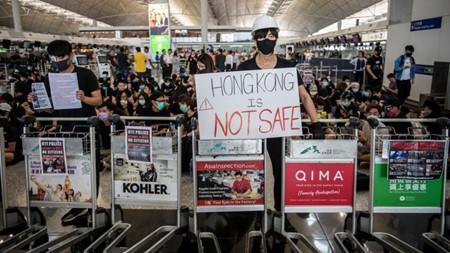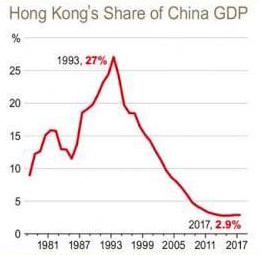Violent Protests In Hong Kong Reach Their Last Stage
by moon of alabama, via Ron Paul Institute:
 The riots in Hong Kong are about to end.
The riots in Hong Kong are about to end.
The protests, as originally started in June, were against a law that would have allowed criminal extraditions to Taiwan, Macao and mainland China. The law was retracted and the large protests have since died down. What is left are a few thousand students who, as advertised in a New York Times op-ed, intentionally seek to provoke the police with “marginal violence”:
Such actions are a way to make noise and gain attention. And if they prompt the police to respond with unnecessary force, as happened on June 12, then the public will feel disapproval and disgust for the authorities. The protesters should thoughtfully escalate nonviolence, maybe even resort to mild force, to push the government to the edge. That was the goal of many people who surrounded and barricaded police headquarters for hours on June 21.
The protesters now use the same violent methods that were used in the Maidan protests in the Ukraine. The US seems to hope that China will intervene and create a second Tianamen scene. That US color revolution attempt failed but was an excellent instrument to demonize China. A repeat in Hong Kong would allow the US to declare a “clash of civilization” and increase ‘western’ hostility against China. But while China is prepared to intervene it is unlikely to do the US that favor. Its government expressed confidence that the local authorities will be able to handle the issue.
There are rumors that some Hong Kong oligarchs were originally behind the protests to prevent their extradition for shady deals they made in China. There may be some truth to that. China’s president Xi Jingpin is waging a fierce campaign against corruption and Hong Kong is a target rich environment for fighting that crime.
The former British colony is ruled by a handful of oligarchs who have monopolies in the housing, electricity, trade and transport markets:
The book to read is Land and the Ruling Class in Hong Kong (2010) by Alice Poon, which explains how the lack of competition law created outrageous wealth for the tycoons. It’s a complex subject but the key point is that in Hong Kong all land is leasehold and ultimately owned by the government, which uses it as a means of raising revenue. This goes back to the days of empire when British policy required colonies to be self-funding. The system kept taxes down and attracted business – but one side-effect was that it gave the government an interest in rationing land to keep it expensive. That didn’t matter much when the local economy comprised a few traders but, in the modern technological world of 2012, it puts the government at odds with every person and business wanting affordable space. Indeed, it induces the government to distort and damage the economy, and indeed society.
This system paved the way for a handful of Hong Kong families to become unimaginably wealthy by getting their hands on cheap land back in the days before the city started to boom.
Rents and apartment prices in Hong Kong are high. People from the mainland who buy up apartments with probably illegally gained money only increase the scarcity. This is one reason why the Cantonese speaking Hong Kong protesters spray slurs against the Mandarin speaking people from the mainland. The people in Hong Kong also grieve over their declining importance. Hong Kong lost its once important economical position. In 1993 Hong Kong’s share of China’s GDP was 27%. It is now less than a tenths of that and the city is now more or less irrelevant to mainland China.

Democracy in Hong Kong is restricted to further the interests of the oligarchs:
In the 70-seat legislature, only half of the members are directly elected. The other half are selected by special interest groups—such as the financial and real estate professions—meaning that the body tends to be controlled by a mostly pro-Beijing business elite rather than by voters. The city’s Beijing-backed leader, Chief Executive Carrie Lam, likewise lacks a popular mandate.
The current protests are surely not an incentive to remove those restrictions or to invest in Hong Kong. They are counter productive.
While the protests against the extradition bill may have been backed by some tycoons, it is obvious that there is also a large US government influence behind them. It is the US, not some oligarchs, which is behind the current rioting phase.
In 1992 Congress adopted the United States–Hong Kong Policy Act which mandates US government ‘pro-democracy’ policies in Hong Kong. Some Senators and lobbyists now push for a Support Hong Kong Human Rights and Democracy Act which would intensify the interference. Before the June protests started Secretary of State (and former CIA head) Mike Pompeo met with the Hong Kong ‘pro-democracy’ leader Martin Lee and later with ‘pro-democracy’ media tycoon Jimmy Lai. The National Endowment for Democracy finances several of the groups behind the protests.
Read More @ RonPaulInstitute.org
Loading...


